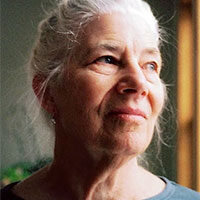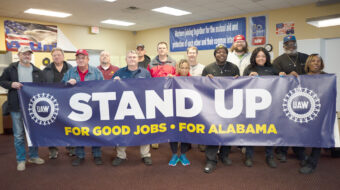
CHARLESTON, S.C. – Up to the eve of the South Carolina Democratic presidential primary, union representatives and leaders of the African-American community were redoubling their efforts to get out the vote, no matter if they supported Bernie Sanders or Hillary Clinton.
The majority of South Carolinians who vote Democratic are African Americans. Many are impatient for a president who can work effectively to reverse policies imposed by the Republican-led state government.
The people of South Carolina desperately need better paying jobs, more accessible health care and better schools.
“White supremacy is still ruling and controlling our lives,” Muhiyidin d’Baha, a Black Lives Matter leader, said in a recent television interview. “The way our schools are organized, the gentrification, is just a continuation of the dehumanization that’s been going on for a long time.”
D’Baha discussed the murder of Walter Scott, an unarmed black man, by a police officer and the killing of nine African American worshippers in the Emmanuel AME church.
“The impact [on the black community] is the same,” he said, “whether it’s violence enforced by law or not. It’s victimization.”
The evening before the primary, Clinton and Sanders both held rallies at Historically Black Universities almost next door to each other in Orangeburg.
The racial wealth gap
“Dems should focus on the racial wealth gap,” wrote Bernie Mazyck and Jeremie Greer in the Charleston Post and Courier. “The median net worth of white households [in South Carolina] is $133,683. The median net worth of black households is $14,413.” Mazyck and Greer are CEOs of community and development organizations.
They explained that “One of the greatest contributors to the creation and expansion of this divide has been federal policy. For example, by allowing states to opt out of expanding Medicaid, the Affordable Care Act has created a health care gap that is disproportionately impacting individuals of color.”
Cleveland Sellers, the president of Voorhees College in Bamberg County and a key SNCC (Student Nonviolent Coordinating Committee) organizer in the 1960s, said that because South Carolina Governor Nikki Haley refused to accept federal Medicaid expansion funds, the county hospital had to shut down. The community was promised an emergency care clinic, but that quickly closed, too.
Over 60 percent of the county’s population is African American.
“There is no OB-GYN in Bamberg County or surrounding counties,” Sellers said. “You have to drive for over an hour to get to one. And if you need major care, they have to take you by helicopter to the nearest hospital.” He has been a leader of the Clinton for President campaign across the state.
Speaking at a rally supporting Sanders, State Representative Justin Bamberg, said that his cousin was recently in a traffic accident in Bamberg County and died because he could not get the care he needed quickly enough.
Sellers said that 42 out of 83 school districts in South Carolina filed a court suit against the state demanding equal funding. The state constitution says that all South Carolina schools have to provide “minimally adequate” educational opportunities for students but districts suing the state were not even able to meet that low standard. The court has ordered the state to re-evaluate its educational standards.
Wasted surplus
Meanwhile, South Carolina has a surplus of some $400 million.
“Instead of spending this money on schools or healthcare,” Sellers says, “Governor Haley is using the money for tax cuts for the wealthy.”
Sellers believes that Hillary Clinton is the candidate best able to fight such policies.
Adam Brown, IBEW Local 776 apprentice instructor, says that South Carolina’s anti-union, “right-to-work” policies contribute to making it difficult for working people to make ends meet.
In 2014, South Carolina was the state with the lowest percentage of union members in its work force, 2.1 percent.
To help build a stronger labor movement, Local 776 has assigned Office Administrator Erin McKee to act as a voter registrar. She has been very successful.
“I don’t know if I’d say that people are voting because they’re excited or terrified,” she said.
“The thought of Republicans getting in and what they’ll do to labor is what’s terrifying.”
Donna DeWitt, president emeritus of the South Carolina AFL-CIO and a leader of South Carolina Labor for Bernie, says that the main problem the State of South Carolina faces is “lack of class consciousness.”
She says that too many poor and working people in the state vote against their own self-interest because they don’t want to unite with workers of another race. “We all have to understand there are consequences when working people are collaborating.”
One answer, she says, is to encourage “dialogues among workers about race.”
DeWitt is supporting Bernie Sanders because she feels that he is helping working people see their real self interest and helping to create an atmosphere in which candid discussions about race can take place.
Jim Campbell, who has worked in the Civil Rights Movement since the 1950s says “Bernie is doing a great job educating people that America must go beyond having just democratic procedures .We must build a substantive democracy, which is democratic socialism.
“However,” Campbell explains, “after education comes mobilization and then organization.
“We must patiently do all the work helping to build a grassroots, rank and file movement or we will never build a better society.”
Campbell says that “Hillary Clinton will lay down the rich soil where the seeds of democratic socialism can grow strong.”
Photo: South Carolina had problems with crumbling roads and bridges and old drinking water systems and dams, and historic 2015 floods. The state faces what will likely be hundreds of millions if not billions of dollars of bills to fix washed out roads and bridges and destroyed dams. Chuck Burton | AP file photo













Comments